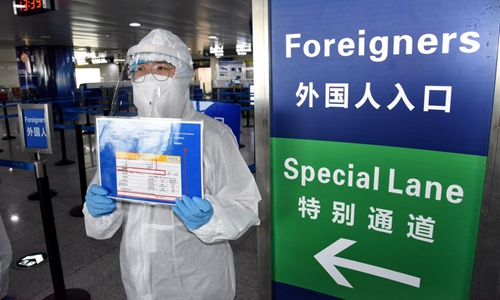HOME >> CHINA
China temporarily bans entry of foreigners in response to surging imported infections
By Zhao Yusha and Chen Qingqing Source:Global Times Published: 2020/3/27 0:59:54 Last Updated: 2020/3/27 3:59:30

A staff member reminds foreigners to fill in an arrival card at Qingdao Liuting International Airport in Qingdao, East China's Shandong Province on March 5. Photo: Xinhua
Foreign nationals are temporarily forbidden from entering China even with valid visas, Chinese authorities announced on Thursday, in a move called by some experts as "semi sealing off of the border" that signals the country's determination to fight the pandemic battle.
The notice was jointly issued Thursday night by the Chinese Ministry of Foreign Affairs and National Immigration Administration and will take effect on Saturday.
The suspension is a temporary measure that China is compelled to take in light of the outbreak situation and the practices of other countries. China will stay in close touch with all sides and properly handle personnel exchanges with the rest of the world under special circumstances. The above-mentioned measures will be calibrated in light of the evolving situation and announced accordingly, the notice said.
This is the strictest measure taken toward foreigners since China's opening-up and reform, which is also an unprecedented step, reflecting the country's decisive and aggressive COVID-19 epidemic prevention and control work in fighting the pandemic battle, said Li Haidong, a professor at the Institute of International Relations of China Foreign Affairs University.
Due to mounting pressure of imported COVID-19 infection cases, China has to take this measure, which is temporary but necessary, otherwise, the result of containment would be threatened, Cai Jiangnan, the director of the Center for Healthcare Management at the China Europe International Business School, told the Global Times on Thursday.
Peking University Professor Zhang Yiwu said this move signals China will partly seal off its border in response to rising numbers of imported infections. "We cannot keep our own nationals outside, so we have to stop foreign nationals from coming in and adding pressure to our virus prevention work," said Zhang.
He noted this measure also suits with other countries to prevent imported infections.
The notice says foreign nationals coming to China for necessary economic, trade, scientific or technological activities or out of emergency humanitarian needs may apply for visas at Chinese embassies or consulates. Entry by foreign nationals with visas issued after this announcement will not be affected.
It's necessary to keep a channel open for foreigners who work in the trade and technology sectors, as the country, which is also the world's factory and largest manufacturer, is resuming work amid the outbreak, said Mei Xinyu, a research fellow with the Chinese Academy of International Trade and Economic Cooperation under the Ministry of Commerce, noting that it will play a decisive role in stabilizing the global economy.
As of Tuesday, China has reported 474 imported cases from 34 countries, with the capital Beijing shouldering the heaviest burden of receiving those patients. The UK is the biggest source of imported cases, according to statistics.
"We can't afford to see cities like Beijing, Shanghai and Guangzhou become a second Wuhan, given the pandemic has been worsening overseas," Yang Zhanqiu, a virologist at Wuhan University, told the Global Times. The policy is necessary as an outbreak rebound would seriously affect Chinese social and economic development, he said.
The pandemic has caused so far more than 490,000 cases worldwide, affecting more than 170 countries and regions and causing 22,184 deaths, according to data compiled by Johns Hopkins University and Medicine.